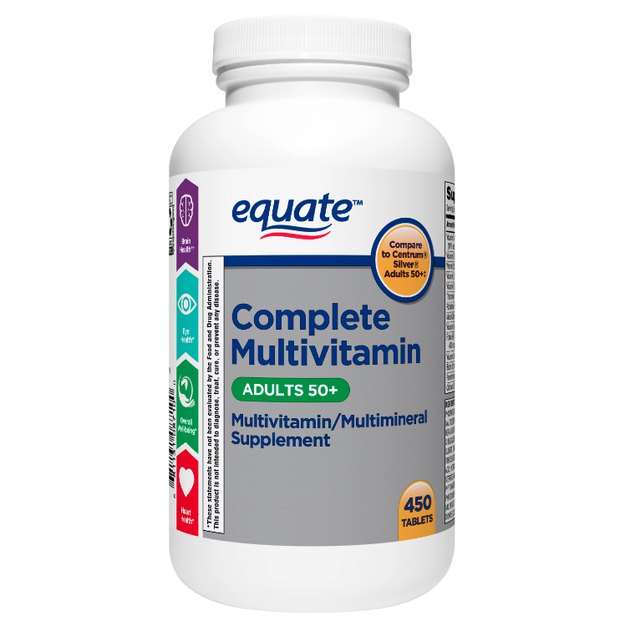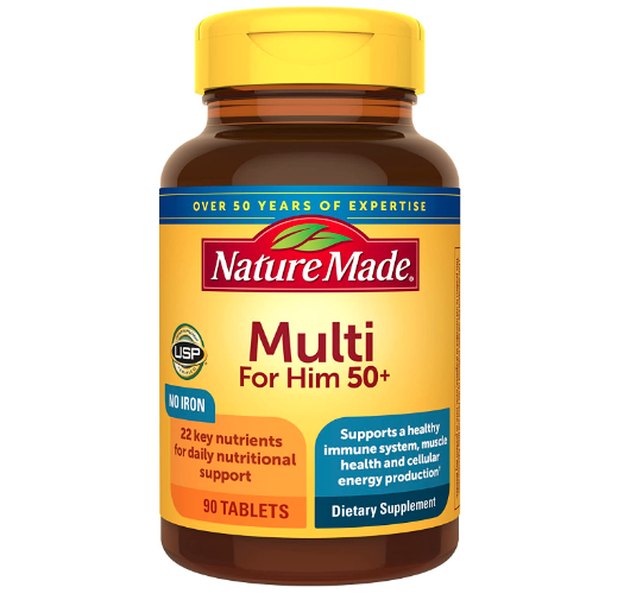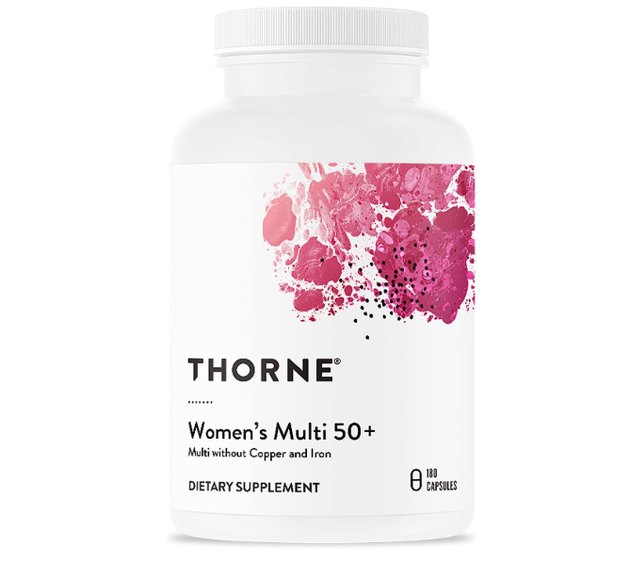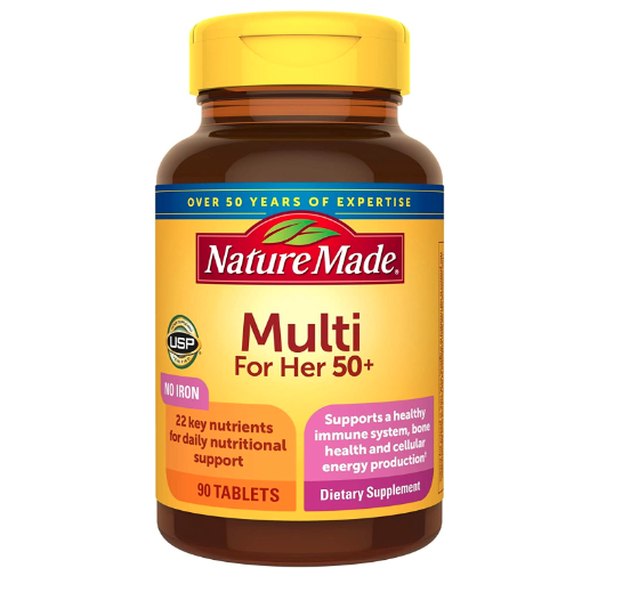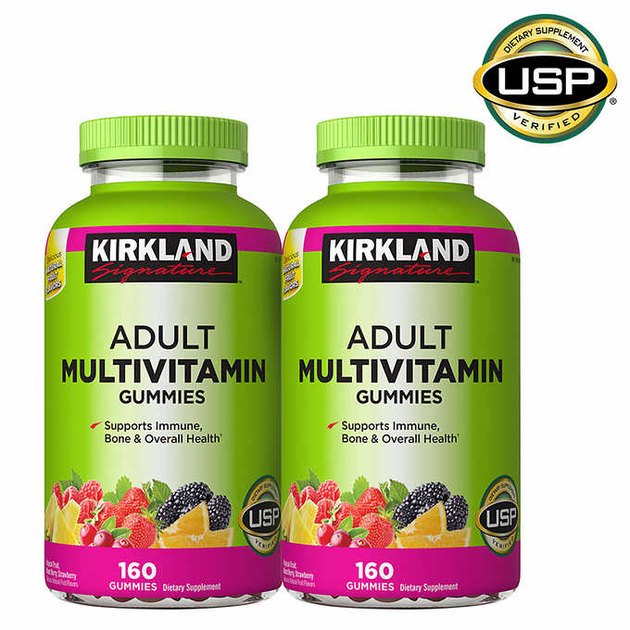
Your nutritional needs evolve as you age — your body will require higher amounts of certain vitamins and minerals and lower amounts of others. That's why the best multivitamin for older adults looks different than a daily vitamin a younger person might take.
Here's a look at recommended multivitamins for seniors, along with tips about what to look for in the vitamin aisle.
Video of the Day
Video of the Day
Our Picks
- Best Overall: Equate Complete Multivitamin Adults 50+ ($13.77, Walmart)
- Best for Men: Nature Made Multi for Him 50+ ($13.59, Amazon)
- Best for Women: Thorne Women’s Multi 50+ ($50, Walmart)
- Best for People Going Through Menopause: Nature Made Multi for Her 50+ ($26.99, Amazon)
- Best Gummy: Kirkland Signature Adult Multivitamin Gummies ($16.99, Costco)
A Note on Language
Here at LIVESTRONG.com, we typically avoid language that implies sex or gender are binary in favor of more inclusive language, but because vitamin manufacturers still largely market their products to women and men, we've used that terminology where it applies here.
How We Chose the Best Multivitamins for Seniors
The FDA doesn't closely regulate supplements as it does medications, so we spoke with a dietitian and reviewed relevant research to recommend the supplements below. (You can learn more about how we review products here.)
We also looked for products with Current Good Manufacturing Practice regulations enforced by the FDA as well as compliance or verification from one of the three main independent quality control groups that test and review supplements:
Warning
Even though dietary supplements are readily available over the counter, they can be harmful when mixed with certain medications, per the FDA. That's important for anyone to keep in mind, but particularly older adults — in the United States, 84 percent of seniors take one or more prescription medications, and 35 precent of seniors are taking five or more, per an August 2019 report from the National Center for Health Statistics.
For instance, taking both warfarin and vitamin E can increase the risk of internal bleeding or stroke, as both act as blood thinners. And, people with kidney disease should speak to their docs before taking a multi because there are special multis developed for them, says certified gerontological specialist Phyllis Famularo, RD, an adjunct assistant professor at Rutgers University.
Always talk to your doctor before adding a new supplement — especially if you're taking medication.
1. Best Overall: Equate Complete Multivitamin Adults 50+
The highly rated Equate Complete Multivitamin Adults 50+ contains more than your daily value of vitamin D, with 1,000 IU, and also provides potassium and calcium, which are important for older adults. Seniors have a risk of bone loss, and calcium helps protect bones and teeth, per the National Institute on Aging (NIA).
And it's a close match with popular brand-name multis at a lower cost. "While Centrum Silver is a household name, a generic multivitamin will be much less expensive and have almost the same composition," Famularo says.
2. Best for Men: Nature Made Multi for Him 50+
This once-daily multi is a USP-verified pick for older men. It claims to support muscle and bone health, immunity and energy.
Each pill contains more than your recommended daily value (DV) for vitamins C, D and E, as well as B6 and B12. It also contains 12 percent of the DV for calcium.
3. Best for Women: Thorne Women’s Multi 50+
This multi from a reputable brand provides 18 percent of your DV of calcium, which helps to keep bones strong. It's also a good source of magnesium.
Many Americans do not get enough of this mineral. People who are 51 and over should get between 320 and 420 milligrams per day, according to the Office of Dietary Supplements (ODS). This multi has 180 milligrams (or 43 percent of your DV).
4. Best for People Going Through Menopause: Nature Made Multi for Her 50+
This once-a-day multi is another USP-verified pick. It has 24 percent of your DV of magnesium and 15 percent of your DV of calcium. It has 1,000 IU of vitamin D (more than your recommended daily allowance).
Plus, it does not contain any iron, a mineral that most people get enough of through their diets after menopause, per the ODS.
5. Best Gummy: Kirkland Signature Adult Multivitamin Gummies
If swallowing large pills is a struggle for you, a gummy is a good way to go. But the problem with these chewable supps is it's hard to get them right: Many gummy vitamins' nutritional makeup doesn't match what's on the label.
This tasty pick is USP-verified and contains 100 percent of your DV for vitamin D as well as more than a full DV of vitamins B6 and B12.
Nutrients Seniors Need in a Multivitamin
Vitamins geared toward older adults typically contain more vitamin D and vitamin B12 and less iron, according to Harvard Health Publishing. They might also contain herbs targeted toward memory and energy.
While the best multivitamin for you depends on your lifestyle and health status, here are some of the vitamins and minerals that are particularly important for older adults.
Vitamin B12
Vitamin B12 is, hands down, one of the best vitamins for older adults. That's because, with age, many are unable to absorb it from food, according to the National Institutes of Health (NIH). They can, however, absorb this important vitamin when it's present in fortified foods or supplements.
Aim to get 2.4 micrograms of vitamin B12 daily.
Vitamin D
Most of the vitamin D in your body is made when your skin is exposed to the sun, according to a February 2023 article in StatPearls. But with age, your skin's ability to make vitamin D declines, according to the Linus Pauling Institute.
Adults ages 50 to 70 should aim for 600 IU of vitamin D per day. Adults 71 and older should aim for 800 IU daily.
Calcium
Calcium and vitamin D go hand in hand. The two nutrients work together to keep your bones healthy. Some research suggests the combination may reduce the risk of fractures in older adults, according to the NIH, but more research is needed.
The recommended dietary allowance (or RDA) for calcium is 1,000 to 1,200 milligrams per day for adults between 51 and 70 and 1,200 milligrams for adults aged 71 and older, per the NIH.
How to Choose a Multivitamin for Seniors and Older Adults
The supplement industry isn't very tightly regulated, making it difficult to navigate. It's important to make sure you're getting a high-quality supplement that actually contains the amount of each nutrient as stated on the label.
The American Cancer Society provides some guidelines on how to choose the best multivitamin for older adults and stay safe when taking supplements:
- Look for reputable brands. Consider the name and reputation of the manufacturer or distributor and do some research on whether or not there have been any claims made against them.
- Check the label for third-party certifications. Look for supplements that have USP or NSF on the label. This means that the manufacturer of the product followed quality standards set for supplements by these organizations.
- Follow dosage instructions — either from the label or from your doctor.
Decide Whether You Need Supplements
Most older folks following a regular, healthy diet probably get enough nutrients from their diet, according to Harvard Health Publishing. But there can be exceptions.
If you have an unbalanced diet or don't have a very good appetite, supplements can help bridge the gap between what you're getting from your food and what your body needs to stay healthy. Older adults who have trouble absorbing nutrients may also need the higher doses of vitamins and minerals that you get from supplements.
There are some disadvantages to taking multivitamins as a senior to be aware of. First off, supplements don't provide the fiber you gain when eating nutrient- and vitamin-packed whole foods, per the National Institutes of Health (NIH). Plus, supplements can be accompanied by side effects and also interact with medications, according to the NIH.
Many people — including seniors — can get the vitamins and minerals their bodies require from food. For example, vitamin B12 is found in meat, poultry, fish and milk, and is also in fortified cereals, per the NIA. And calcium, a key mineral for seniors, is available in dark leafy greens, dairy and canned salmon, as well as other foods, according to the NIA.
If you're unsure about what route is best for you, talk to your doctor or a registered dietitian — these experts can help guide you and develop a healthy supplement regimen for you if you need one.
- AARP: "Supplements to Take in Your 50s, 60s and 70s"
- Harvard Health Publishing: "Should You Take 'Senior' Multivitamins?"
- Linus Pauling Institute at Oregon State University: "Micronutrients for Older Adults"
- National Institute on Aging: "Vitamins and Minerals"
- Johns Hopkins Medicine: "Is There Really Any Benefit to Multivitamins?"
- National Council on Aging: "Healthy Eating Tips for Seniors"
- USDA ChooseMyPlate: "Healthy Eating As We Age"
- Journal of Aging and Gerontology: "The Role of Vitamin D in the Aging Adult"
- National Institutes of Health Office of Dietary Supplements: "Omega-3 Fatty Acids"
- American Cancer Society: "Choosing and Using Dietary Supplements Safely"
- National Institutes of Health Office of Dietary Supplements: "Vitamin D"
- National Institutes of Health Office of Dietary Supplements: "Calcium"
- Harvard Health Publishing: "The A List of B12 Foods"
- ConsumerLabs: "Multivitamin and Multimineral Supplements Review"
- Office of Dietary Supplements: "Magnesium"
- Mayo Clinic: "Iron Supplementation Typically Not Recommended for Postmenopausal Women"
- American Academy of Ophthalmology: "Vitamins for AMD"
- FDA: "Mixing Medications and Dietary Supplements Can Endanger Your Health"
- Office of Dietary Supplements: "Vitamin B12"
- Mayo Clinic: "Vitamin B-12"
- StatPearls: "Vitamin D Deficiency"
- Mayo Clinic: "Mayo Clinic Q and A: How much vitamin D do I need?"
- ODS: "Iron"
- National Center for Health Statistics: "Prescription Drug Use Among Adults Aged 40–79 in the United States and Canada"
- National Institutes of Health: "Vitamins and Minerals for Older Adults"
